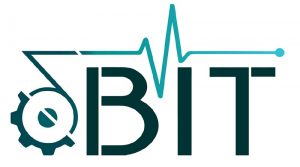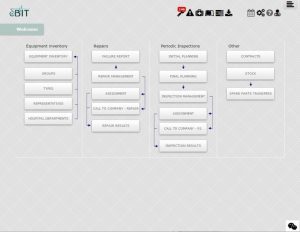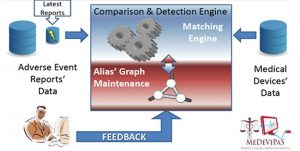Current Research Projects
BME-ENA – Biomedical Engineering Education Tempus Initiative in Eastern Neighbouring Area (2013-2016): Programme: TEMPUS IV 2013, EU

Today, Biomedical Engineering (BME) is one of the fastest growing technological areas in the developed world, in part due to population ageing and the related increased needs, the increasing awareness of the importance of health in human productive life and the high added value of BME products and services. As a consequence, the role of biomedical engineers is becoming essential in both the industrial and the health care delivery sectors. The future of BME as a profession is for that reason in high demand. In a recent study, the US Dept. of Labor predicts that the BME profession will be among the “hottest” jobs by the end of this decade. Actually, it is stated that “biomedical engineers are projected to be the fastest growing occupation in the economy”. Therefore, it is clear that countries that will not invest in BME education will be unable not only to develop but also to even use efficiently existing and forthcoming health care technologies.
The objective of the TEMPUS IV BME-ENA project is to promote BME Education in the EU and Eastern Neighbouring Area (ENA), through the creation of joint multidisciplinary MSc programs in the field of Biomedical Engineering. The structure of the programs will be built upon the European Higher Education Area principles, thus facilitating the harmonization and leading to comparable degrees based on two main cycles and the European Credit Transfer System (ECTS) that will allow mutual recognition and increased students and teaching staff mobility. Through these MSc programs, close collaboration links will be established between the ENA and the EU project partners, links that are expected to be well maintained after the project completion. This will have major positive effects in both, the health technology industrial sector and the health delivery system through the appropriate management and safe use of medical devices.
The BME-ENA project will enable 4 ENA Partner Countries: Armenia, Georgia, Moldova and Ukraine to face the challenges of biomedical technology through capacity building measures. There is an increasing demand for BME specialists in these countries, since advanced technologies are implemented in the healthcare sector. The project will focus on the creation of 4 joint BME MSc educational programs, which will be designed and implemented according to the most recent development in the field and following the recommendations of a previous very successful TEMPUS IV CRH-BME Project. The BME-ENA project consortium is established to meet the needs and achieve the project’s objectives, and it consists of 7 EU and 10 ENA Partner Institutions from 11 countries. The ultimate goal of the BME-ENA project is to prepare a new generation of Biomedical Engineers, able to understand, develop, manage and use advanced medical technology.
BaziFIT – A joint development agreement between BITU and BaziFIT Inc., USA (2013-to date)

BaziFIT is a complete virtual personal training system. The novel sensor technology makes traditional gym equipment
smart. Adaptive algorithms and real-world expertise from fitness professionals combine to make workouts
customized for the user.
Our Team is developing the Sensor Design (Hardware), the Sensor Firmware, the wireless Communication Protocol
and the part of the iOS and Android Apps that handle the commands and the data transfer between the sensor and
the smart phone. The system consists of a Bluetooth Low Energy (BLE) enabled sensor featuring a 3D digital
accelerometer and a 3D digital gyroscope, a smartphone, as well as Android and iOS Apps. The sensor is attached
directly onto gym equipment and tracks all its movement.
Dedicated Firmware controls the data sampling and transmission and runs the exercise related Algorithm which in
turn calculates a score relevant to the subject’s performance. Additionally the Firmware supports over-the- air
updates to allow for future application program updates. The calculated score is sent to a paired iPhone for
visualization. The raw data is also transmitted to a paired smartphone and synced to a Cloud for further processing,
analysis and storage.
Recent Research Projects
The most recent R&D projects implemented by BITU are the following:
Software Development & Medical Device Inventory for biomedical technology management (2014-2015) – NSRF (National Strategic Reference Framework)

BITU implemented the project “Software Development & Medical Device Inventory for biomedical technology management” of the Act “Integrated Information Technology Infrastructure and Services for Healthcare Management and Assessment”.
The aim of the project was:
- To develop a Medical Equipment Management System (MEMS), a highly important tool that supports Clinical Engineering Departments (CED) of Hospitals in effectively monitoring and controlling medical equipment;
- To establish a detailed inventory of the medical equipment located in 180 Greek Hospitals and Health Centres. For each piece of equipment, useful data (Device Category and Group, Manufacturer, Model, Serial number, Supplier, Location in the health unit, Date of installation, etc.) were collected and then imported in δ-BIT, the MEMS developed by BITU. Upon completion of the project, every health unit involved was given access to the system, which allows better managing and scheduling all necessary actions.

CRH-BME – Curricula Reformation and Harmonisation in the field of Biomedical Engineering (2009-2012): Programme: TEMPUS IV, EU

The CRH-BME project – Curricula Reformation and Harmonisation in the field of Biomedical Engineering (BME) is a Joint Project within the TEMPUS IV program, involving 17 Institutions from EU and 6 Institutions from Partner Countries.
The project aims to update existing curricula in the field of Biomedical Engineering in order to meet recent and future developments in the area, address new emerging interdisciplinary domains that appear as a result of the R&D progress and respond to the BME job market demands.
The generic Biomedical Engineering programs will assist participating Institutions to restructure their existing programs in full compliance with the Bologna Declaration and the ECTS and especially those that are in their initial stage of their educational system reform.
QUICOM – Quantitative Inspection of Complex Composite Aeronautic Parts Using Advanced X-ray Techniques (2012-2015): Programme: FP7, EU

QUICOM (Quantitative inspection of complex composite aeronautic parts using advanced X-ray techniques) is a research project coordinated by the University of Wels, Austria, with the participation of a number of leading companies in the field of aeronautics, such as EASN, Airbus, La Composite and EADS. The aim of the project is to take the next big step in the development of aeronautic components by developing a new technology platform of highly detailed inspection methods in combination with advanced composite modelling and simulation.
The project will generate new concepts and methods based on cutting edge X-ray techniques, which aim to escalate conventional non-destructive techniques in aeronautics on the short run and to replace them on the long run. BITU has been invited to participate in this Consortium in a knowledge translation effort from medical simulation to aviation applications.
MEDEVIPAS – “Medical Devices Vigilance and Patient Safety” (2012-2015): Programme: “THALIS” – Operational Programme “Education & Lifelong Learning”

Although recent technological advancements have led to much more reliable and safer Medical Devices, potential risks of failure and the associated adverse incidents cannot be neglected. Actually adverse incidents, due to medical devices, have recently increased in absolute terms, because of the exponential increase in the number of devices used today.
Through the design, development and implementation of modern ICT tools for medical devices vigilance, the MEDEVIPAS project has created a prototype system, which provides critical, on time and customized information to health care institutions concerning the potential problems/failures of medical devices and ways to avoid their repetition.
Therefore, the MEDEVIPAS project is related to the improvement of patient safety in the healthcare systems, in terms of technology necessary to provide rapid and accurate information for adverse events. This modern approach of Medical Devices Vigilance system is not only based on official user reports but also includes the introduction of additional means for data mining, standardization and codification of the information from different sources worldwide.
HUTON “HUman-TOol Network” (2012-2016) – Programme: TEMPUS IV, EU

The technological developments, especially in the domain of health, in parallel with the growth and integration of information and communication technologies in the life play today an important role in the restructuring of the whole area of the Southeast Europe. Consequently, the HUTON project aims at providing educational background, dedicated to help resolving the following two aspects, being of a general importance for the Republic of Serbia (RS):
- The development of modern and efficient evidence-based rehabilitation services integrated into an improved health-care system based on up-to-date medical technologies;
- Provision of know-how to professionals for the optimized use of new technologies in rehabilitation and assistance to elderly population communication technologies.
The University of Patras, represented by BITU, is one of the three EU Universities that participate in this project.
PISRA4B – Phase Contrast Imaging Simulation and Reconstruction Algorithms for Digital Breast Tomosynthesis (2012-2015): Programme: ARISTEIA / General Secretariat for Research and Technology (GSRT)
This research project focuses on Phase Contrast Imaging Simulation and Reconstruction Algorithms for Digital Breast Tomosynthesis (PISRA4B). Phase Contrast Imaging is a newly developed technique which is based not only on X-ray attenuation but also on the X-ray phase change arising from diffraction and refraction effects during X-ray scattering.
Its aim is to evolve and upgrade the X-ray Imaging Simulator created by the group, with a simulation platform for this emerging and promising X-ray imaging modality. The developed simulator, combined with the 3D breast models created by the Breast Simulator, can be used to produce simulated images of breast. Tomosynthetic reconstruction algorithms for Phase Contrast Imaging of breast will be developed and tested using these tools along with an extended validation and optimisation procedure for both simulation and reconstruction algorithms. This procedure will be performed using a physical phantom that will be created for that purpose.
Past Research Projects
The main R&D projects implemented by BITU in the past can be found below:
- 2012-2013: Collaboration with Sony to examine the potential of a development of a breast X-ray imaging modality using new state of the art detectors of the manufacturers.
- 2010-2013: Advanced Studies on 3D Digital Tomosynthesis in Breast Imaging
Programme: “HERACLITUS II” – Operational Programme “Education Lifelong Learning” - 2008-2009: WideMEDnet “A Mediterranean Network for Higher and Continuing Medical Education Resources”, Programme: INTERREG IIIB – ARCHIMED
- 2006 – to date: Operation of the Medical Devices Quality and Safety Testing Unit (MEDIP)
- 2006-2009: Study and Design of a Micro-CBCT System for Medical Applications
Programme: PENED 2003 / General Secretariat for Research and Technology (GSRT) - 2006-2008: INTRAMEDNET “A Mediterranean Research and Higher Education Intranet in Medical Sciences”
Programme: INTERREG IIIB - 2006-2008: Medical Devices Quality and Safety Testing Unit (MEDIP)
Programme: AKMON / General Secretariat for Research and Technology (GSRT) - 2005-2006: Control of Specifications, Compatibility and Quality in Medical Devices
Greek Ministry of Health - 2004-2006: Development of Simulation Methods and Techniques
Programme: “PYTHAGORAS” EPEAEK – 3rd European Support Framework - 2004-2006: Network for Future Regional Health Care
Programme: INTERREG IIIC - 2003-2005: Financial Analysis of Health Services in Greece
Programme: PENED 2001 / General Secretariat for Research and Technology (GSRT) - 2003-2004: Study on the Capacity of Dental Services for Athens 2004 Olympic Games
Greek Ministry of Health - 2002-2003: 01 PRAXE 59 “Integral Support Solutions in Biomedical Engineering”
Programme: PRAXE / General Secretariat for Research and Technology (GSRT) - 2001-2003: Interdepartmental Postgraduate Programme on Biomedical Engineering
Programme: EPEAEK – 3rd European Support Framework - 2000-2004: Open Distance Learning in Biomedical Engineering
Programme: MINERVA, EU
